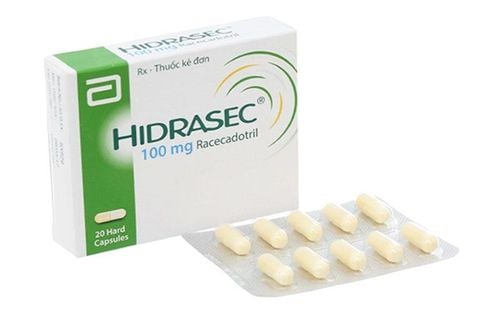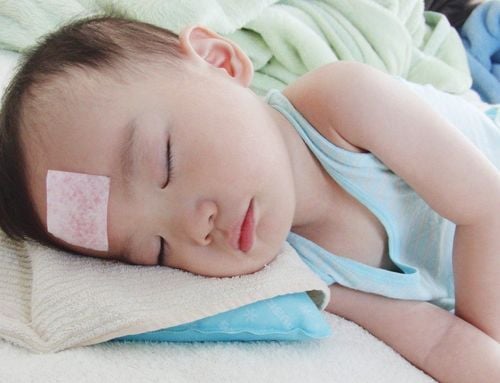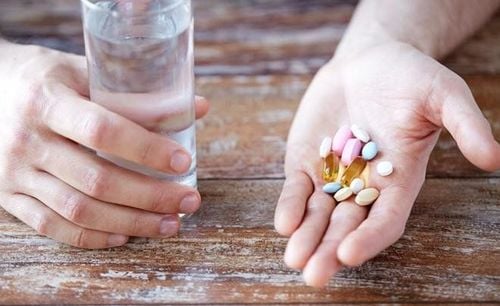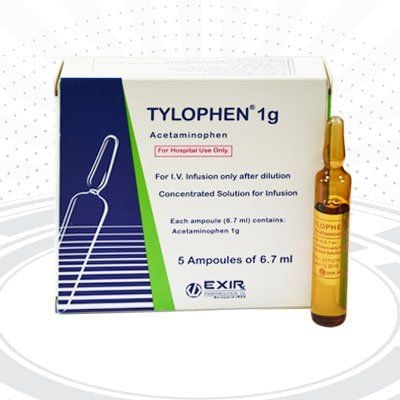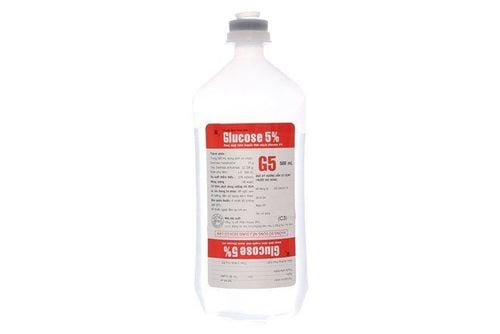This is an automatically translated article.
The article was professionally consulted by Dr. CCII Tran Thi Linh Chi - Department of Pediatrics - Neonatology - Vinmec Hai Phong International General Hospital
Most children often have a fever, when a child has a fever, parents are very worried, so they rush to give the child medicine when it is not necessary.
1. How much fever can children take?
Fever in children has many causes, so it is necessary to determine the cause of the fever, combine treatment with both causes and symptoms to quickly return to normal.
To determine whether a child has a fever, parents need to measure the child's body temperature with a thermometer, not just determine the fever by touching the forehead and making an estimate.
When the child has a fever of how many degrees, the child should take medicine:
In the case of a child with a fever below 38.5 degrees C: This temperature is determined to be a mild fever and in this case, it is not necessary to use fever-reducing medicine, but only use physical means. Use a warm towel to wipe the child in areas such as forehead, armpits, neck, groin every 15 minutes until the child has no fever, loosen clothes, put on cool clothes for the child, if the child is under 6 months old Feed the baby on demand and increase the number of feedings. If the child is over 6 months old, besides breastfeeding, the child can drink more Oresol water to compensate for electrolytes. In case the child has a fever above 38.5 degrees Celsius: From the temperature of 38.5 degrees, the child should take fever-reducing medicine and combine with physical methods to help reduce the child's fever as in the case of mild fever. In addition, children's fevers are caused by many causes, so parents should take their children to a medical facility to determine the cause and have a doctor prescribe fever-reducing drugs and doses appropriate for the child. Fever above 39 degrees Celsius: A fever at this temperature can lead to a febrile seizure. In this case, after giving the child fever-reducing medicine, wearing cool clothes should send the child to the hospital for timely treatment, if the child has a seizure, use a soft cloth in the child's mouth to prevent the child from biting. tongue and must quickly bring down the fever, remove the child's clothes.
Trắc nghiệm: Sự phát triển tinh thần, vận động của bé thế nào là đúng chuẩn?
Khi nào bé biết nói, biết hóng chuyện hay biết cầm cốc là "đúng chuẩn"? Điểm xem bạn biết được bao nhiêu mốc phát triển tinh thần, vận động "đúng chuẩn" của bé nhé!The following content is prepared under supervision of Thạc sĩ, Bác sĩ y khoa, Ma Văn Thấm , Nhi , Phòng khám Đa khoa Quốc tế Vinmec Dương Đông(Phú Quốc)
2. Antipyretic drugs for children
In your personal medicine cabinet, you should stock up on some medicines, including antipyretics. The most commonly used antipyretics are Paracetamol (also known as Acetaminophen) and Ibuprofen. However, Paracetamol is the preferred drug because:Safe, can be used for many subjects, properly used, few side effects and easy to use. Ibuprofen is not recommended for use in children under 1 year of age. Because of the high rate of dengue fever in Vietnam, Ibuprofen is not widely used, because it increases the risk of bleeding in dengue disease. For children with fever, it is recommended to give them a simple type of Paracetamol: The main ingredient of the drug is only Paracetamol, which has antipyretic and mild anti-inflammatory effects. Used in cases of fever caused by teething, viral fever... There are many forms of preparations suitable for children such as powder packs with many flavors that are easy to drink, quick-acting, syrups or rectal types. Should choose drugs with concentrations of 80mg, 150mg and 250mg for children, depending on the weight of each child.

3. How should I take antipyretics?
Unreasonable drug use has adverse effects on children's health, and can even lead to death due to acute fever-reducing drug poisoning. How to use antipyretic drugs to ensure safety for children and limit side effects of drugs.
Should only use antipyretic drugs for children when the child's fever is over 38.5 degrees Celsius. The dose when giving children each fever is 10-15 mg/kg near severe. The interval between 2 doses of the drug is at least 4-6 hours if the child still has a fever. The total dose should not exceed 60mg/kg/24 hours. In case the fever is high and the baby can't take medicine, it is possible to consider giving antipyretic with anal suppository, the insertion of the drug into the anus should be done gently, to avoid injuring the anal area. Note that rectal tablets may have a slower antipyretic effect than powder packs. Pay attention to the expiry date of the medicine, make sure that the child takes the medicine with the expiry date.

4. Notes when the child has a fever
Many parents think that a child with a fever should not take a bath, but in fact, giving the child a bath with warm water (a quick shower, or just wiping the body) will help the baby cool down effectively. This does not affect the health of the baby. Wipe your baby with warm water, not cool water. Because when warm, the blood vessels dilate to release heat, thereby helping the baby's body cool down. If the wipe is cool, it causes vasoconstriction, making the body retain more heat, which is dangerous for the baby. Note that Paracetamol and Ibuprofen should not be used simultaneously to reduce fever in children because it will be dangerous and increase unwanted effects. When the baby has a fever, if the baby has been eating solid foods, you can give him/her thin food such as porridge, soup, and drink a lot of water to rehydrate the body with babies over 6 months old. Young children increase breast-feeding, according to the needs of the child. Cases of fever should be taken to a medical facility when: Children younger than 2 months old Children with high fever above 40 degrees Celsius The child is dehydrated with symptoms such as: Dry skin, sunken eyes, crying without tears. Children appear convulsive Children have a lot of headaches, vomiting a lot, unusual neck stiffness. Skin rash Uncontrollable body temperature, despite taking antipyretics. Children appear to have changes in perception such as: lethargy, lethargy, difficult to wake up, or cry a lot, and break away. The child has difficulty breathing and does not improve after clearing the child's nose. The child cannot swallow food; unable to breastfeed or drink water. When a child has signs of fever, parents need to measure the temperature with a thermometer to accurately determine the child's body temperature, when the child has a fever of 38.5 degrees Celsius or higher, fever-reducing drugs can be used.
If after taking fever-reducing medicine, the child's condition still does not improve, parents should take the child to the Pediatrics Department of Vinmec hospital for examination and treatment soon, to avoid prolonged high fever causing many dangerous complications. to the nervous system.
As a key area of Vinmec Health system, Pediatrics Department always brings satisfaction to customers and is highly appreciated by industry experts with:
Gathering a team of top doctors and nurses in Pediatrics : consists of leading experts with high professional qualifications (professors, associate professors, doctorates, masters), experienced, worked at major hospitals such as Bach Mai, 108.. Doctors All doctors are well-trained, professional, conscientious, knowledgeable about young psychology. In addition to domestic pediatric specialists, the Department of Pediatrics also has the participation of foreign experts (Japan, Singapore, Australia, USA) who are always pioneers in applying the latest and most effective treatment regimens. . Comprehensive services: In the field of Pediatrics, Vinmec provides a series of continuous medical examination and treatment services from Newborn to Pediatric and Vaccine,... according to international standards to help parents take care of their baby's health from birth to childhood. from birth to adulthood Specialized techniques: Vinmec has successfully deployed many specialized techniques to make the treatment of difficult diseases in Pediatrics more effective: neurosurgery - skull surgery, stem cell transplantation. blood in cancer treatment. Professional care: In addition to understanding children's psychology, Vinmec also pays special attention to the children's play space, helping them to have fun and get used to the hospital's environment, cooperate in treatment, improve the efficiency of medical treatment.
Please dial HOTLINE for more information or register for an appointment HERE. Download MyVinmec app to make appointments faster and to manage your bookings easily.







